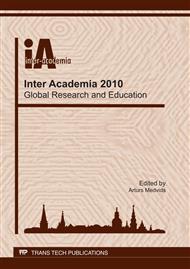[1]
Zilberstein, S.: Using Anytime Algorithms in Intelligent systems, AI Magazine, Vol. 17, No. 3, (1996), pp.73-83.
Google Scholar
[2]
Takagi, T., M. Sugeno, Fuzzy Identification of Systems and Its Applications to Modeling and Control. IEEE Trans. on Systems, Men, and Cybernetics, Vol. 15 (1985), pp.116-132.
DOI: 10.1109/tsmc.1985.6313399
Google Scholar
[3]
Tanaka, K., H.O. Wang: Fuzzy Control Systems Design and Analysis, John Wiley & Sons, Inc. New York, (2001).
Google Scholar
[4]
Tanaka, K., T. Taniguchi, H.O. Wang: Robust and Optimal Fuzzy Control: A Linear Matrix Inequality Approach, In Proc. of the 1999 IFAC World Congress, Beijing, China (1999), pp.213-218.
DOI: 10.1016/s1474-6670(17)56916-5
Google Scholar
[5]
Yen, J., L. Wang: Simplifying Fuzzy Rule-based Models Using Orthogonal Transformation Methods, IEEE Trans. on Systems, Man, and Cybernetics, Vol. 29: Part B, No. 1, (1999), pp.13-24.
DOI: 10.1109/3477.740162
Google Scholar
[6]
Yam, Y.: Fuzzy Approximation via Grid Sampling and Singular Value Decomposition, IEEE Trans. on Systems, Men, and Cybernetics, Vol. 27, No. 6, (1997), pp.933-951.
DOI: 10.1109/3477.650055
Google Scholar
[7]
Takács, O. and A.R. Várkonyi-Kóczy: Iterative Evaluation of Anytime PSGS Fuzzy Systems. In P. Sincak, J. Vascak, K. Hirota (eds. ) Quo Vadis Machine Intelligence? - The Progressive Trends in Intelligent Technologies, (Ser. Advances in Fuzzy Systems – Applications and Theory, Vol. 21) World Scientific Press, Heidelberg, (2004).
DOI: 10.1142/9789812562531_0006
Google Scholar
[8]
Várkonyi-Kóczy, A.R., A. Ruano, P. Baranyi, and O. Takács: Anytime Information Processing Based on Fuzzy and Neural Network Models, In Proc. of the 2001 IEEE Instrumentation and Measurement Technology Conference, IMTC/2001, Budapest, Hungary, (2001).
DOI: 10.1109/imtc.2001.928275
Google Scholar
[9]
Klement, E. P, L.T. Kóczy B. Moser: Are fuzzy systems universal approximators?, Int. Jour. General Systems, Vol. 28, No. 2-3, (1999), pp.259-282.
DOI: 10.1080/03081079908935238
Google Scholar
[10]
Baranyi, P., Y. Yam, Ch-T. Yang, and A.R. Várkonyi-Kóczy: Complexity Reduction of a Rational General Form. In Proc. of the 8th IEEE Int. Conference on Fuzzy Systems, FUZZ-IEEE'99, Seoul, Korea, Vol. 1, (1999), pp.366-371.
DOI: 10.1109/fuzzy.1999.793267
Google Scholar
[11]
Baranyi, P. and A.R. Várkonyi-Kóczy: Adaptation of SVD Based Fuzzy Reduction via Minimal Expansion, IEEE Trans. on Instrumentation and Measurement, Vol. 51, No. 2, (2002), pp.222-226.
DOI: 10.1109/19.997816
Google Scholar
[12]
Fung, Y.C.: An Introduction to the Theory of Aeroelasticity, John Wiley and Sons, New York, (1955).
Google Scholar
[13]
O'Neil, T., T.W. Strganac: An Experimental Investigation of Nonlinear Aeroelastic Response, AIAA Journal of Aircraft, Vol. 35, No. 4, (1998), pp.616-622.
Google Scholar
[14]
Tanaka, K., T. Ikeda, H.O. Wang: Robust Stabilization of a Class of Uncertain Nonlinear Systems via Fuzzy Control: Quadratic Stabilizability, H¥ Control Theory, and Matrix Inequalities, IEEE Trans. on Fuzzy Systems, Vol. 4, No. 1 (1996), pp.1-13.
DOI: 10.1109/91.481840
Google Scholar


